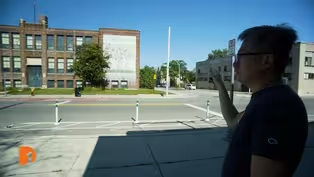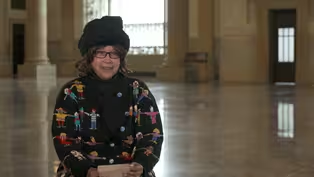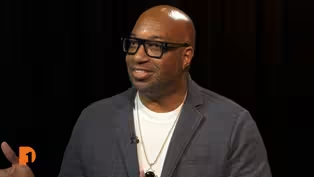
Rob Edwards discusses his graphic novel ‘Defiant’
Clip: Season 10 Episode 3 | 6m 47sVideo has Closed Captions
Rob Edwards’ graphic novel details a little-known story in America’s Black history.
Detroit-born screenwriter Rob Edwards has written a graphic novel detailing a little-known figure of America’s Black history: Robert Smalls. One Detroit’s Chris Jordan caught up with Edwards at Comics & More in Madison Heights to talk about his novel “Defiant” and why a comic book is a perfect, if unorthodox, way to teach kids Black history.
Problems playing video? | Closed Captioning Feedback
Problems playing video? | Closed Captioning Feedback
One Detroit is a local public television program presented by Detroit PBS

Rob Edwards discusses his graphic novel ‘Defiant’
Clip: Season 10 Episode 3 | 6m 47sVideo has Closed Captions
Detroit-born screenwriter Rob Edwards has written a graphic novel detailing a little-known figure of America’s Black history: Robert Smalls. One Detroit’s Chris Jordan caught up with Edwards at Comics & More in Madison Heights to talk about his novel “Defiant” and why a comic book is a perfect, if unorthodox, way to teach kids Black history.
Problems playing video? | Closed Captioning Feedback
How to Watch One Detroit
One Detroit is available to stream on pbs.org and the free PBS App, available on iPhone, Apple TV, Android TV, Android smartphones, Amazon Fire TV, Amazon Fire Tablet, Roku, Samsung Smart TV, and Vizio.
Providing Support for PBS.org
Learn Moreabout PBS online sponsorship- [Narrator] Let's turn now to Detroit born screenwriter, Rob Edwards, who's known for his work on Disney's the Princess and the Frog and Treasure Planet.
His comic series "Defiant" was released last month in graphic novel form.
The story is about Robert Smalls, a little known figure in black history.
One Detroit's Chris Jordan caught up with Edwards at Comics & More in Madison Heights.
They talked about "Defiant" and how the comic book teaches African American history to kids.
(people chatting) - Hey.
- How's it going?
- Great, great.
How you doing?
- Good to see ya.
Rob Edwards.
A lot of viewers will know your work as a screenwriter from stuff like Princess and the Frog, Treasure Planet, In Living Color, Fresh Prince.
- Yeah.
- A very storied career in TV and film, but now your latest project is a graphic novel.
- Yes.
- About the life of the fascinating and way too little known still historical figure, Robert Smalls.
- Exactly, yeah.
And that's the tragedy is that this guy lived this extraordinary life, and just nobody knows about him.
You know, you tell people, and the first question, they don't say like, "Well, wait, and then what did he do?"
They say, "Why don't I know about this guy?"
- For those who are watching who don't know anything about Robert Smalls, tell us the short version of his story.
- He was a, you know, born a slave.
When he was about 23 years old, he was, during the Civil War, he was basically signed to work on this ship, the Planter, which ferried munitions back and forth.
And one night when the white crew took off, they commandeered the boat.
All their families got onto the boat, and they took off.
They went through five checkpoints, (Rob laughs) disguised as the captain, and then surrendered the ship to the Union Army that was just outside of Charleston Harbor.
He then became rich because it was loaded with weapons.
And so it was the biggest hall in the Civil War.
He was famous for pulling this thing off.
- Yeah.
- He then ran for Congress five times, won.
He started a printing press.
He started a railroad.
He's the reason why we have black people in the military because they showed courage, you know, intelligence and strength.
He's the reason why we have public schools.
So, (Rob laughs) 'cause he really, really wanted to be able to read all of his life.
So that is the shortest version possible.
- Wow.
- Of the extraordinary life of Robert Smalls.
- How did you decide that you were gonna tell this story and that this was how you were gonna tell it?
- Well, actually, the story starts here in Bloomfield Hills, where a classmate of mine, a guy named David Baxter, I'd gone to Cranbrook with, he calls me up and he says, "Hey, we got this script."
And he gave it to me and said, "You know, well, what do you think?"
And basically the story, well written, but it focused on the heist itself.
You know, just the taking of the Planter.
And as I was reading it, and then went down the rabbit hole of like, all the stuff that this guy had done, I said, "Well, I think that that's the beginning of the story.
I think that it's about a man who is free in his heart, he becomes free, and then he does all the things that you, you know, you do when you've been caged for so long."
And I said, "Well, I hope you don't mind, but rather than just give a bunch of notes on it, I'd like to take a crack at it.
And also I think it's important that a story like this be told by a black author, just because it's, you know, times we live in, and also my filter is different."
- Of course.
- And so for me as a, I'm not a historian.
I'm just a writer.
I just write Disney movies and stuff.
And so I took it as a character study.
What kind of person would do this thing?
And I discovered actually that as I was doing it, that in a lot of ways I was able to find things that the historians were not 'cause I was asking questions that they weren't.
You know, I was always focused on like, well, where's the family, and whatever, you know?
And why would he do this?
Rather than what did he do, why would he do it?
And so it's just been a really great journey for me.
- Since you are a screenwriter, how did you end up deciding to write it as a graphic novel rather than just a screenplay?
- Well, it's interesting because I had just been into Netflix with a project, and we just kept hitting against the fact that we didn't have IP, you know, that there was no intellectual property that it was based on.
And my heart had been broken so many times, you know, by the kind of risk averse world that I said, well, you know what, let's not go in just with the story.
Let's go in with something, you know?
And the books that were out there were good, but none of 'em did what wanted to do.
So I said, well, look, I'm writing the script anyway, (Rob laughs) you know, I know the story.
Why don't we just make a graphic novel of it?
If the graphic novel works, then we know we're in good shape.
And the graphic novel was fantastic.
I thought, okay, well this guy's basically larger than life anyway.
He's essentially a superhero, so why not?
It's a perfect format for him.
And also like for kids that will be hearing this story for the first time, what better way to hear it, you know?
Meet people where they live.
You know, I think for the kid that I most wanna hear this, it's graphic novel.
- It was funded with a very successful kickstarter campaign.
- Yes.
- And something that you had told me that really stood out to me was how many of the contributions were people buying boxes of the comics to have sent to schools and libraries.
- Yes, yeah, people wanted to buy a, you know, boxes of 'em and take 'em to schools.
Because I do think it's important, you know, what better, you know, gift, (Rob laughs) you know, at, you know, Black History Month or whatever to kind of like, you know, go outside, and there's a great box of these fantastic comic books.
Hopefully they'll be fun to read and everything, and inspirational, life changing, I believe.
I would think that if I was a kid, if I was, you know, 10, 15 or whatever, and I read the story, I would say, okay, that is the measure of a great man.
You know?
(Rob laughs) What would it take for me to be like that?
Okay, I should read this story.
And then, wow, what did he do afterwards?
Well, okay, public schools, (Rob laughs) you know, whatever.
The military.
You know, just proving one after the other to people that were skeptical, and the all the more reason why, you know, you need this story to kind of emphasize why we need, you know, history, why we need to learn all this stuff.
Curtis Chin’s memoir chronicles the life lessons he learned in his family’s Chinese restaurant
Video has Closed Captions
Clip: S10 Ep3 | 6m 6s | Curtis Chin’s memoir chronicles the life lessons he learned in a Chinese restaurant. (6m 6s)
The history of WCHB: The first FCC-licensed African American radio station in the nation
Video has Closed Captions
Clip: S10 Ep3 | 2m 21s | Annette Bass of West Bloomfield shares the history of the Bell Broadcasting family and WCHB radio. (2m 21s)
Kwame Alexander discusses the inspiration for his books and new PBS KIDS series
Video has Closed Captions
Clip: S10 Ep3 | 7m 43s | Best-selling author Kwame Alexander discusses his literary works, career and passion for writing. (7m 43s)
One Detroit Weekend | Things to do around Detroit this weekend: July 17, 2025
Clip: S10 Ep3 | 2m 3s | Contributors Cecelia Sharpe and Peter Whorf share events happening in and around Detroit. (2m 3s)
Providing Support for PBS.org
Learn Moreabout PBS online sponsorship
- News and Public Affairs

Top journalists deliver compelling original analysis of the hour's headlines.

- News and Public Affairs

FRONTLINE is investigative journalism that questions, explains and changes our world.












Support for PBS provided by:
One Detroit is a local public television program presented by Detroit PBS



